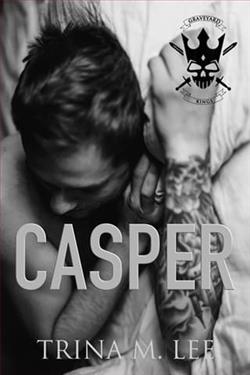Page 40 of Hallow Hill at Halloween: Part One
“I have noticed that you don’t sell much unless tourists are in town, and then you selleverythingall at once.” That earned me a small smile. “You probably think I’m a bubble-headed magistrate who likes clothes, but I do pay attention to my friends. And to some extent my brothers-in-law.”
She sniffed. “You know nothing about my affairs because they’re my own, but for your information, I have a thriving business selling to wealthy fae who want a wrap with a custom charm woven in.”
“I guess I’m a very lucky human to have one of those.”
She lifted her nose in a pose of superiority, but gave up a smile of concession. “Alright. But I shan’t be gone long.”
She turned the sign around to CLOSED, beckoned me onto the cobblestone walk in front of the shop like the whole thing was her idea, then waved her hand at the door.
“So, you’re having… What was that?” she asked.
“Toddy. You’ll love it.”
One of my favorite tables was available next to a cheery fire. To make it even more perfect, all the tables were unoccupied in the side room so Esme could talk freely without worrying about patrons with enhanced auditory abilities.
“Go sit down by the fire. I’ll tell Jeff and be right there.”
Jeff was at the bar, polishing glasses and holding them up to the light. “Afternoon, Magistrate,” he said.
Does everybody have to call me that?
“Call me Rita or I will start calling you barkeep.”
He laughed softly. “What can I get you?”
“Two toddies.”
He leaned past me, seeming to want to make the point that I was there with a friend. “Right away.” He smiled.
“Thank you.” I gave him the semi-confused look he had coming.
Sitting down in the chair next to Esme, so I could lean in if necessary, I said, “Jeff’s making them now. So, tell me what happened with Kagan.”
“Like I said, it’s a long story.”
“Start at the beginning and tell it word by word.”
She sighed. “I grew up in a town about two hours from here. Two hours by car that is. Kenilworth. Did you know that?”
“You know perfectly well I didn’t know that. You’re very secretive and careful to let nothing personal leak.”
“Yes, well, there’s a good reason. A long time ago, I was human.” I couldn’t help looking surprised. No. Make that shocked. “For someone who’s only seen modern times, it’s impossible to describe how comparatively awful life was then. My father passed away from some awful disease, and my mother kept us alive with her spinning and weaving. She was good. And she was fast. If there was one fortune with us, it was that we lived in a market town, and there was always demand for her beautiful fabrics. She was able to sell as much as she could produce, but there was an inescapable limitation. When she wasn’t sleeping, she worked. But she did her best to be cheerful for my sake. I didn’t appreciate it at the time.”
She looked away for a minute and I recognized the look of regret that sometimes besets all of us as we allow past memories to creep into our consciousness and haunt us. After a small pause, she sighed and took up where she’d left off.
“One year was exactly like the next until it wasn’t. I was probably fourteen or so when a season came that made life worse than usual. Not for us, but for the people who lived in and around the town. There was rain. So much that it washed the crops away, taking livelihoods with it. If that wasn’t bad enough, the constantly cold and damp conditions made people sick. The gravedigger was at work night and day.
“The people reacted the way people often did back then. They assumed that good things must come from a god who lives in the sky and bad things must come from witches who live among them disguised as friends or neighbors. It wasn’t the least unusual for the scapegoat to be a widow. That made it easy to confiscate whatever she owned after she was beyond protest.
“Folklore held a belief in a mystical relationship between witches and spinning and had forever for all I know.” She looked up at me with shimmering eyes and held my gaze.
“They came for your mom,” I whispered.
She nodded.
“Here you are,” Jeff said brightly as he set the toddies down.
I managed a nod, but didn’t thank him out loud as would’ve been my custom. Ever perceptive, he glanced at Esme, and left.















